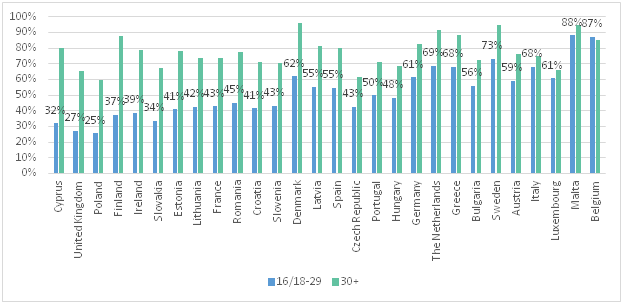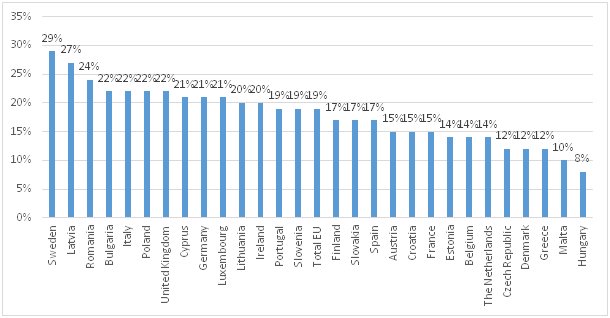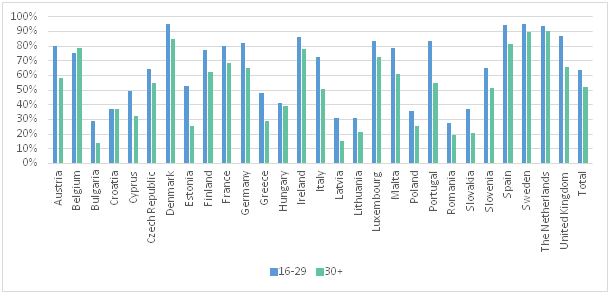After the Brexit referendum more and more people started to realize how little we know and care about the political activity of the youth. The results made it clear: the youth have significantly different views on certain issues, but their absence from voting resulted in the victory for Brexit. In our analysis we looked at the statistics regarding the political activity and passivity of young voters in Hungary and the European Union to better understand the background of this phenomenon (18-29).
The absence of young voters in the UK is not unprecedented. Previous election results clearly show: young Brits are the least politically active – together with Polish youngsters, while Hungarians are in the mid-range in a European comparison.
 Participation rate of different age groups at the previous national elections (Survey taken in Summer 2014). Source: EES 2014
Participation rate of different age groups at the previous national elections (Survey taken in Summer 2014). Source: EES 2014
Youngsters are a the most ambivalent voter group in general: some of them are purposely not interested in politics, but in the same time some of the are the most active supporters of new, anti-establishment parties – let them be greens, radical right-wing, new leftists or liberals. Low participation of young voters – and their openness towards new actors – are related to their overall rejection of traditional parties and politics.
 Would you consider standing as a candidate in a political election at some point in your life? Rate of yes answers. Source: Flash Eurobarometer 375 (2013)
Would you consider standing as a candidate in a political election at some point in your life? Rate of yes answers. Source: Flash Eurobarometer 375 (2013)
This is particularly true in the case of Hungarians: party membership and the idea of political activism is the lowest among them in Europe: according to a research in 2013 only 8 % of them considered running for office as an option once in their lifetime. There are not many examples to follow though: there were only three members were under 30 years in the Hungarian Parliament in 2014 – by now only one of them is still under 30 (all of them were from radical right-wing Jobbik.)
The other most important thing to know about this generation is their concerns. It is pretty obvious that they consider the problems of starting their independent life the most important: unemployment, working conditions, financial problems, housing, costs of everyday life. In the meantime they don’t pay much attention to social systems like health care, pensions, which are specifically important for the older generations.
There is the biggest difference between generations regarding cultural issues, and the extension of rights for homosexuals is one of the most important of them. In 26 out of 28 countries young voters are more likely to agree with the idea of same sex marriage than the older generations. However these differences are not that obvious regarding economic issues (such as distribution, taxation of the wealthy).
 Same sex marriages should be allowed throughout Europe. Source: Eurobarometer 83.4 (2015)
Same sex marriages should be allowed throughout Europe. Source: Eurobarometer 83.4 (2015)
Although there are strong characteristics and concerns (unemployment, housing and education) of young Hungarian or European generations, we can’t refer to them as unified voter group. Dealing with these and other issues they aren’t interested in that much in new terms, in more appealing way can be one of the most crucial things traditional parties should try to do. Young generations’ activity and impact on politics can only be stronger if they and political parties are able to be more open to each other. But only a more conscious and claiming young generation can make political parties change their attitudes and create programmes which are dealing with only the problems and interest of the (traditionally politically active) older generations, but theirs too.
This is the summary of the analysis available in Hungarian HERE, for more information please contact Réka Csaba at .



